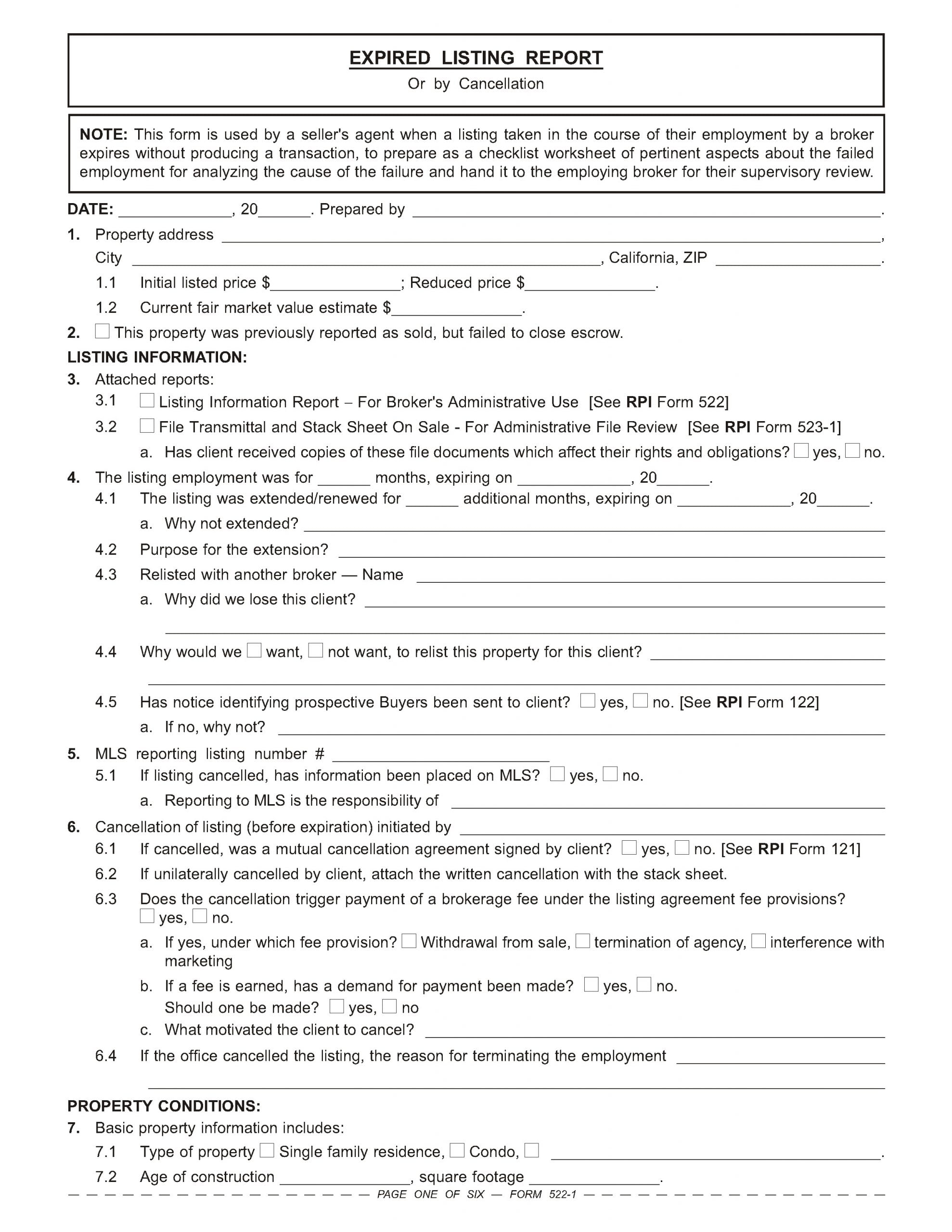This form is used by a seller’s agent when a listing taken in the course of their employment by a broker expires without producing a transaction, to prepare as a checklist worksheet of pertinent aspects about the failed employment for analyzing the cause of the failure and hand it to the employing broker for their supervisory review.
Gathering marketing information
Over 80% of all real estate sales transactions are conducted through a sphere of influence — meaning it was premised on an existing relationship which led to a sale, according to a national trade association. Further, 90% of buyers and 70% of sellers report they intend to use their same agent again on future transactions, or refer others to them for real estate services.
Without collecting and harvesting client information, agents and brokers are continuously hunting down new clientele without building repeat business — or business connected to prior clients.
In addition to a broker or agent’s existing marketing campaign — which may consist of multiple categories of leads, such as FARM leads, web leads and niche specialization leads — brokers and agents use forms to document and retain client information. The broker or agent then uses the information collected in the forms to better mine for clients and quickly expand the number of potential fee-generating transactions they are able to close. Harvesting client data known to the agent is undertaken as part of an agent and broker’s forward-looking marketing activities.
Client data is documented at numerous points in a transition, such as:
- when a listing is entered into [See RPI Form 522];
- when a property is sold and the objective of the employment is fulfilled [See RPI Form 523]; and
- when a listing expires without producing a transaction or is cancelled. [See RPI Form 522-1]
Together, the related series of forms contain a wealth of pertinent information which is later used by the broker or agent for marketing purposes, such as:
- how the client found the brokerage [See RPI Form 522 §5];
- the client’s contact information and motivation to sell [See RPI Form 522 §6.3];
- the client’s relocation intentions when selling [See RPI Form 522 §6.4];
- the source of the buyer who purchased the listed property, such as the local MLS, internet or open house [See RPI Form 523 §13];
- the reasons why a client cancels a listing, why it expired without an extension, and the marketing activities conducted to locate a buyer [See RPI Form 522-1 §§4, 6 and 9]; and
- the client’s cooperation and participation in the listing of their property. [See RPI Form 522-1 §§14 and 15]
Continue reading for commentary specific to the use of each form.
A duty to supervise
Although obtaining and later evaluating client activity enhances the broker or agent’s marketing efforts, it is but one reason for tracking transactions through forms. Another reason is to fulfill the employing broker’s supervision requirements.
A broker needs to require their agents to report when:
- a listing is taken;
- an offer is accepted; and
- the sale closes escrow.
However, it’s prudent practice for brokers to have their agents report transaction activity by documentation at every step of the process. Documentation provides primary evidence of the agent’s activities which helps the broker fulfill their duty to supervise. It also gives the broker a paper trail (or digital trail) to refer to when something goes wrong, such as agent negligence or a client pursuing legal action against the broker and sales agent.
Tracking the transaction
When a sales agent enters into a listing with a client for the services of their broker’s staff, they need to prepare and submit a checklist type of form to the broker’s transaction coordinator (TC), office manager or the broker themselves.
On the form, the agent notes all relevant information about activities undertaken over the course of the employment. [See RPI Form 522]
The broker reviews these completed forms, directly or through the TC or office manager they have employed. The review needs to be done regularly — once a week or at least once a month depending on the nature of the listing and the size of the broker’s staff.
When escrow is closed on a sales transaction, a property sold report is prepared. The property sold report lists the property’s sales price and the fees paid to the broker, listing agent and any referral fees. It also contains information on trust account funds, service providers and the buyer and seller for structuring future marketing. [See RPI Form 523]
Alternatively, when the property does not sell and the listing expires or is cancelled, the agent files an expired listing report. Here, the agent details the steps taken to sell the property, why the property did not sell and whether the brokerage should consider working with that client in the future. [See RPI Form 522-1]
Using an expired listing report
A seller’s agent uses the Expired Listing Report published by RPI when a listing taken in the course of their employment by a broker expires without producing a transaction. It allows the agent to prepare a checklist worksheet of pertinent aspects about the failed employment for analyzing the cause of the failure and hand it to the employing broker for their supervisory review. [See RPI Form 522-1]
The Expired Listing Report contains:
- the property address and price [See RPI Form 522-1 §1];
- a checklist of reports to attach, such as the Listing Information Report [See RPI Form 522; See RPI Form 522-1 §3];
- details on the expiration of the listing [See RPI Form 522-1 §4];
- MLS reporting information [See RPI Form 522-1 §5];
- details on the cancellation of the listing [See RPI Form 522-1 §6];
- basic property information and conditions [See RPI Form 522-1 §7];
- negative aspects of the property and what could have been done to make the property more acceptable and suitable for buyers [See RPI Form 522-1 §8];
- the direct marketing used to locate buyers, such as yard signs, flyers, online MLS postings, open house events, newspaper and magazine ads and public event distributions [See RPI Form 522-1 §9];
- the indirect marketing activities used to locate buyers, including submission to the local MLS, caravan activity and weekly MLS trade meetings [See RPI Form 522-1 §10];
- whether a marketing or listing package was prepared for prospective buyers and how it was used [See RPI Form 522-1 §11.1];
- a checklist of the contents of the listing package and how the package assisted prospective buyers and seller’s agents [See RPI Form 522-1 §§11.2 through 11.3];
- other promotional activities that may have helped locate a buyer for the property [See RPI Form 522-1 §12];
- whether contract negotiations were conducted with prospective buyers for the property and what happened with them [See RPI Form 522-1 §13];
- the seller’s level of cooperation and participation [See RPI Form 522-1 §14];
- the seller’s involvement or interference in marketing the property [See RPI Form 522-1 §15];
- the seller’s motivation to list and sell the property and what they intend to do with the property since it hasn’t sold [See RPI Form 522-1 §16]; and
- final observations, recommendations and comments from the agent, including their opinion on what caused the listing not to sell. [See RPI Form 522-1 §17]
Using the Expired Listing Report allows agents to document the activities undertaken in listing the property and present the data to their employing broker for use in supervising as required.
The broker then takes the information on the report into account as a detailed record of all facts which relate to the transaction. The record indicates which techniques were implemented and which ones were not, helping brokers identify techniques that did not work to produce a sale and are therefore to be improved or discontinued.
Ultimately, the report helps agents and brokers avoid having clients cancel a listing, or allow a property listing to expire unrenewed without a sale for the same reason that already occurred. Past mistakes are avoided, and the operations of the brokerage are therefore improved.
Further, like the Listing Information Report and Property Sold Report, the Expired Listing Report also provides an opportunity for the broker to collect and harvest pertinent client data for future marketing. [See RPI Form 522; See RPI Form 523; See RPI Form 522-1]
Form navigation page published 11-2021. Updated 01-2026.
Form last revised 2015.
Form-of-the-Week: Listing Information Report, Property Sold Report and Expired Listing Report — Forms 522, 523 & 522-1
Form-of-the-Week: Property Sold Report — Administrative and Fee Information — Form 523
Article: Tracking transactions handled by a broker’s agents
Career Coach: marketing and soliciting offers















I am looking for a commercial lease-multi tenants-gross ( form 552-1) but the displace is form 522-1.
I am a long time student of First Tuesday, would you please email me the form 552-1 or upload the correct form.
Thank you.
Dear Howard,
Thank you for bringing this error to our attention, it has now been fixed. Additionally, we will be sure to email you this form.
Best regards,
Editorial Staff